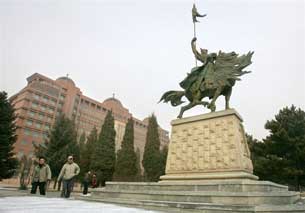 |
|
|
Hohhot, China: Students
approach a statue of
Mongolian hero Genghis
Khan on the Inner
Mongolia University
Campus. 2006 (AFP photo)
|
An Inner Mongolian dissident who became a Mongolian citizen is released after six months in Chinese custody
HONG KONG—Chinese authorities have freed a Mongolian dissident after detaining him for more than six months and repeatedly interrogating him in custody, the dissident said.
“I was detained at Beijing International Airport on Jan. 6 and no reason was given,” Jaranbayariin Soyolt said in a telephone interview from his home in the Mongolian capital, Ulan Bataar.
“I stayed at the Beijing Security Bureau Detention Center for two days, then the Inner Mongolia Security Bureau people transferred me to the No. 2 Detention Center of Inner Mongolia. I was then a member of the Inner Mongolia People’s party,” he added.
Soyolt is an ethnic Mongol and native of China’s Inner Mongolian province. He was traveling to Beijing in January on a translation assignment, he said. He was released and returned to Mongolia on June 17, he said.
Because of his membership in the opposition Inner Mongolia People’s Party, he said, he was repeatedly interrogated in custody and accused of “splittist” activities.
Exiled dissident
Soyolt was a leader of the 1981
Mongolian Student Movement, formed
to protest Chinese government plans
to move Han Chinese into Inner
Mongolia. Chinese Mongolians now
comprise less than 20 percent of the
region's 24 million people.
He later went into exile in Mongolia
and was granted citizenship in 1997,
but Beijing still views him as a
Chinese citizen.
Enhebatu, leader of the U.S.-based
Southern Mongolian Information
Center, said Soyolt has long been
regarded as a nuisance by the
Chinese authorities.
“The Mongolian government repeatedly
asked the Chinese government to
release Soyolt and inform the
Mongolian government of his status,”
Enhebatu said.
Finally, on April 12, Chinese
authorities took the position that
Soyolt remained a Chinese citizen,
he said.
Tumenwuliji, a Mongolian freelancer
and friend of Soyolt’s, said Chinese
authorities never explained that
position.
'Inconceivable'
“Back in 1997, Soyolt was naturalized as a Mongolian citizen… he has legal Mongolian citizenship with the Mongolian president’s signature on it,” Tumenwuliji said. “This is inconceivable.”
In a June 4 appeal, Amnesty International called for Soyolt's urgent released, saying it feared he was at risk of torture.
On the day of his detention, it said, two colleagues travelling with him went through customs and immigration checks ahead of Soyolt. "After waiting for him for two hours, his colleagues returned to inquire about the reason for his delay. At the customs counter, they saw Jaranbayar Soyolt handcuffed and surrounded by five policemen."
Soyolt phoned a colleague on Jan. 11, under duress, and said he was being detained "because of problems with his passport, and asked that nothing about his arrest be revealed to foreign media in order not to 'make things worse,'" Amnesty International said.
Original reporting by Han Qing for RFA’s Mandarin service. Translated by Jia Yuan. Mandarin service director: Jennifer Chou. Written and produced in English by Sarah Jackson-Han.







